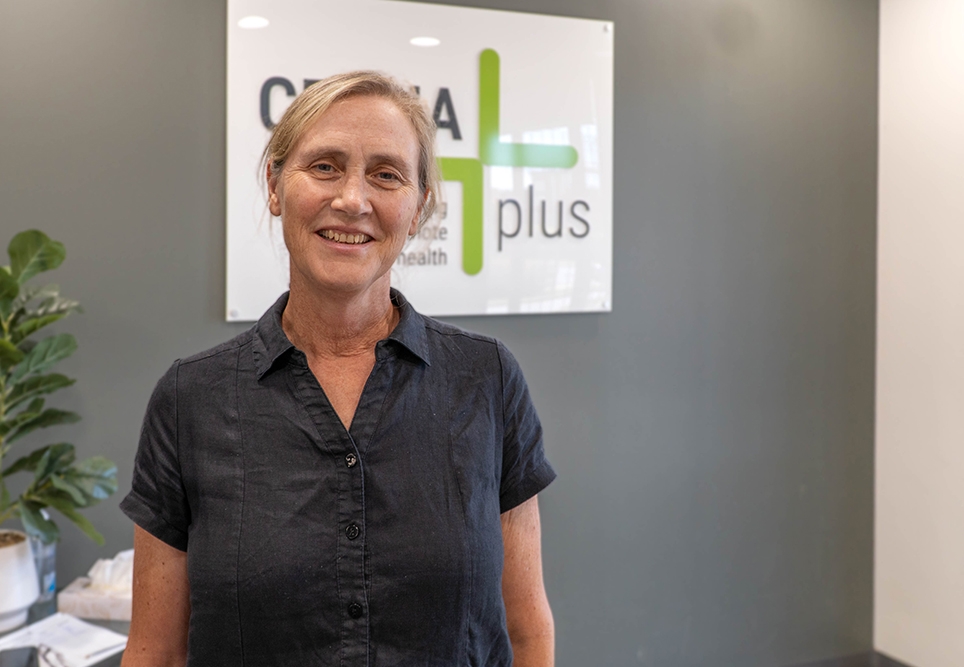
“The empowerment of First Peoples clinicians and the transformative potential of digital health are pivotal in shaping the future of health care in Australia, particularly in remote and underserved communities,” says Kate.
Kate is passionate about encouraging the uptake of digital health technology. Health care often suffers from a lack of access to up-to-date resources, training, and specialist support and Kate sees digital technology has the power to bridge these gaps.
“It’s not a fix-all,” she says. “But we have to embrace digital technology and be shown why it is so useful, how it can enhance the patient’s journey. At the moment, we are in this digital no-man’s land. New digital health solutions are being developed, but frontline workers often don’t have the training or time to integrate them effectively.”
Kate believes the disconnect between developers and frontline healthcare workers is a major issue. Too often, new digital tools are introduced without proper training or context, leading to frustration and underutilisation.
“Nurses and clinicians need to be actively involved in digital transformation – not just as end users, but as co-designers of solutions that improve patient care,” she says. This requires more education, hands-on training, and a collaborative approach where health care and tech industries work together.
Kate sees potential for partnerships between CRANAplus and other health organisations
and companies in the health industry.
“We can share the load and have open discussions about digital enhancement, education, training, mentoring, and support of all health professionals.”
Kate’s belief in the potential of digital technology in health reform was reinforced when she completed the Australasian Digital Health Institute’s Women in Digital Leadership program.
“I’ve seen incredible digital solutions being developed – ranging from AI-driven diagnostics to advanced telehealth platforms – but the challenge is in implementation. Many healthcare professionals struggle with digital adoption because they have not been adequately trained or shown how technology enhances patient care.”
But she disagrees that digital literacy is automatically a generational challenge.
“I firmly believe that anyone can learn – if the process is made engaging and relevant.
“We need to ensure that digital training is practical, user-friendly, and directly linked
to improving patient outcomes,” she says.
“It’s true that many nurses working in remote areas are older, and perhaps not of the digital generation. There are lots of gaps in digital education and I believe that’s a space where CRANAplus can be really useful.
“CRANAplus and other healthcare organisations have an opportunity to drive this change by developing courses that equip remote health practitioners with the digital skills they need.”
First Peoples-led health care
“CRANAplus has long advocated for increasing First Peoples’ participation in health care,” says Kate.
“During my time on the organisation’s Round-table, discussions consistently emphasised the need for targeted support to help First Peoples pursue nursing pathways. While progress has been made, much work remains.”
In her 40-year career, from hospital-based training in Melbourne to remote and tropical medicine in the Torres Strait, Kate has seen a real shift.
More First Peoples from remote communities are choosing to enter nursing, she says,
“but we need stronger support systems to ensure their success.”
“I have always been a firm believer in the ‘grow your own’ model of health care, which invests in training and developing local healthcare workers within their own communities.
“Many First Peoples health staff I have worked with have struggled with having to leave their communities to attend university due to factors such as home-sickness, weather and caring responsibilities. This is where digital technology can be very useful, offering a blended approach to learning of face-to-face and online options.”
“First Peoples health workers are not just professionals; they are trusted figures who understand the cultural and social fabric of their communities. It has been incredibly rewarding to witness more First Peoples pursuing careers in nursing.
“Historically, healthcare services in remote First Peoples communities have been heavily reliant on visiting health professionals, who often provide short-term support without long-term community integration. This model lacks continuity and fails to foster locally driven healthcare leadership.”
“Over the past 15 years, I’ve mentored many aspiring health workers who possess a natural aptitude for learning and caregiving. I recall a moment of great pride for the community of Thursday Island when, for the first time, an entire ward was staffed by Torres Strait Islander nurses – a clear sign of progress in First Peoples healthcare leadership.
“The importance of culturally appropriate care is critical, as is the role that First Peoples leadership plays in achieving better health outcomes for these populations.
“Continued investment in scholarships, mentorship programs, and culturally appropriate education pathways is essential to achieve this.”
